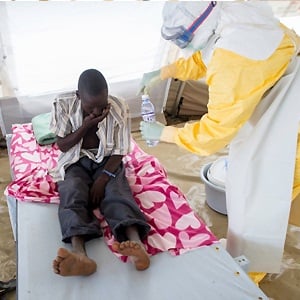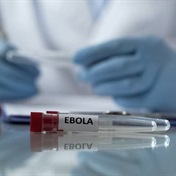
The 2014 Ebola outbreak in west Africa is the worst outbreak of the haemorrhagic disease since it was discovered in 1976.
In total, 1 201 cases including 672 deaths (case fatality rate 56%) have been reported during the 2014 outbreak.
Since Ebola was discovered in 1976, some 1 200 people have been killed by the virus from 3 147 cases - illustrating the virulence of the virus this time round.
Stay up to date: All the latest news on the Ebola outbreak
Signs and symptoms of Ebola
Symptoms present themselves anywhere from 2 to 21 days after infection, but mostly between day 8 and 10. The symptoms are similar to the flu, cholera, typhoid and malaria.
Signs and symptoms: Fever, headache, joint and muscle aches, weakness, diarrhoea, vomiting, stomach pain and lack of appetite.
This is followed by vomiting, diarrhoea, rash, impaired kidney and liver function, and in some cases, both internal and external bleeding. Bleeding can occur from the eyes, ears, nose, mouth and anus.
The WHO reports that laboratory findings include low white blood cell and platelet counts and elevated liver enzymes.
People are infectious as long as their blood and secretions contain the virus. Ebola virus was isolated from semen 61 days after onset of illness in a man who was infected in a laboratory.
Science writer David Quammen, who has investigated the origins and spread of the virus, writes that “RNA viruses (of which Ebola is one) produce acute infections, severe for a short time and then gone. Either they soon disappear or they kill you.”
Take a look: Symptoms from onset, from the US Centres for Disease and Control
Diagnosing Ebola
Diagnosing the disease in someone who has been infected for only a few days is difficult because early symptoms, such as eye inflammation and skin rash, resemble symptoms of several other more common conditions.
If Ebola is suspected, laboratory tests should be done promptly. Only one laboratory in South Africa (the National Institute for Communicable Diseases NICD) is equipped to perform tests for Ebola.
This laboratory serves as a World Health Organisation reference centre for haemorrhagic diseases and also provides this diagnostic test service to many other African countries.
There is no treatment or cure.
Read more:
Exclusive:South African woman fleeing Sierra Leone talks to Health24 about the situation on the ground
Could Ebola hit South Africa?
The NICD urges health workers to be on the lookout for people with symptoms of Ebola




 Publications
Publications
 Partners
Partners











